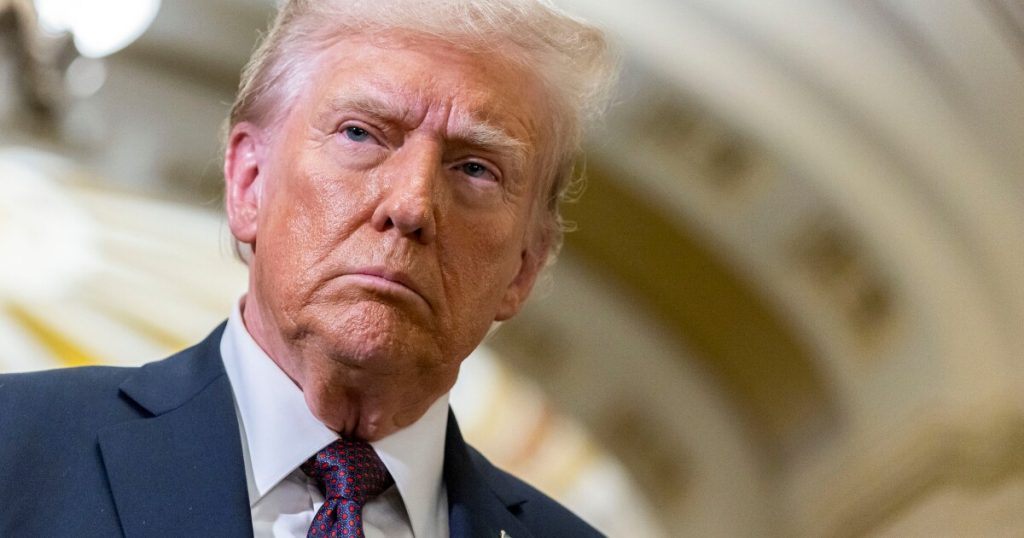The irony of President Donald Trump threatening to upend global trade is that the ensuing uncertainty has actually been a boon to U.S. financial markets — at least in the near-term.
Investors, bracing for the impact of Trump imposing steep tariffs against the U.S.’s closest trade partners, flocked to the safety of 10-year Treasuries and dollars as safe, liquid assets. As a result, the values of both rose sharply earlier this week before the import tax hikes were paused for further negotiations.
For decades, the U.S. has been the premier safe haven for global investors, thanks to the size of its markets, the established rule of law and its political stability. The dollar is used as a reserve currency by other governments and a means of settlement for cross-border business transactions — more so than
“We’re already doing an awful lot of brand damage,” said Karen Petrou, managing partner at Federal Financial Analytics. “The question is how much can we absorb?”
The
The fear is that policies that weaponize the U.S.’s economic standing to accomplish political goals — such as tighter border security — could tarnish the appeal of the nation’s financial markets over time.
Komal Sri-Kumar, a senior fellow at the Milken Institute and independent macroeconomic consultant, said the U.S.’s financial primacy confers to it the benefits of seigniorage, or the profit margin between what the production cost of producing a currency and its face value. When that full value is being paid by foreign entities or individuals, he said, the proceeds effectively subsidize financial costs within the country, not just for the federal government, but also banks and citizens.
“The U.S. Treasury now gets a lot of money from foreigners. We sell them Treasury bonds, they give cash and we are able to use it to buy goods and services from anyone we please. If they are going to [stop buying Treasuries], or do less of it, it becomes more expensive for the U.S. Treasury to borrow,” Sri-Kumar said. “If the Treasury yields rise, the mortgage rate rises and [bank] funding costs rise.”
Using the country’s economic weight for non-economic purposes is not unique to Trump. President Joe Biden’s broad use of sanctions, particularly
In particular, a cadre of large and emerging economies have openly discussed forming multilateral agreements that would allow for non-dollar settlements, or even creating their own shared currency. The group, known as BRICS — short for founding members Brazil, Russia, India, China and South Africa — has expanded its ranks in recent years to include Egypt, Ethiopia, Iran and the United Arab Emirates.
Trump’s response to this possibility has been to threaten the BRICS nations with 100% tariffs if they attempt to ditch the dollar.
But the president’s desire to maintain the dollar’s position as the world’s reserve currency and preferred settlement instrument appears to be at odds with a more fundamental policy objective: closing the U.S. trade deficits with various other countries around the world. Sri-Kumar said a trade imbalance is baked into the position of being at the center of the global financial system and having an economy that grows faster than the rest of the world.
“Trump said he objects to the U.S. trade deficit, but the U.S. trade deficit is the way in which we also keep up our high standard of living,” he said, adding that simply looking at the balance of inbound and outbound goods and services does not account for total cross-border financial activities. “Even if we have a trade deficit, we don’t have a deficit in the total balance of payments.”
A strong dollar also undermines the objective of growing the domestic manufacturing base by increasing labor and production costs relative to other nations. Michael Redmond, a U.S. policy economist for Medley Global Advisors, said the administration’s apparently contradictory goals make it hard to anticipate future policy changes.
“It is all very confusing for markets to understand which of these policy priorities he puts ahead of the other when they are contradictory,” Redmond said. “That’s just an inherent challenge for somebody who decides policy more on his personal whims than on a detailed policy process.”
Less than one month into his second stint in the Oval Office, Trump’s tough talk on tariffs has proven to be more a negotiating tactic than an actual economic policy tool. His threats to hike duty fees on Canada and Mexico appear to have extracted near-term concessions from the two countries on border security. It remains to be seen whether the move results in meaningful changes to trade or adjustments to tariff rates going forward.
In the near term, the U.S. does not appear to be in jeopardy of losing its dominant position in global finance. No other country or currency is even close at the moment. But this status is not etched in stone, said Jai Kedia, a research fellow at the Cato Institute, a libertarian think tank.
“If the U.S. keeps doing stuff like this, eventually people will lose faith in the U.S. economy. The odds of this happening are very low, but that is what’s going to come from extended chaos,” Kedia said. “Yes, that might bring down the dollar value … but this is the equivalent of shooting yourself in the foot to defeat your enemy. The dollar value is reduced but at an insanely high domestic cost.”

